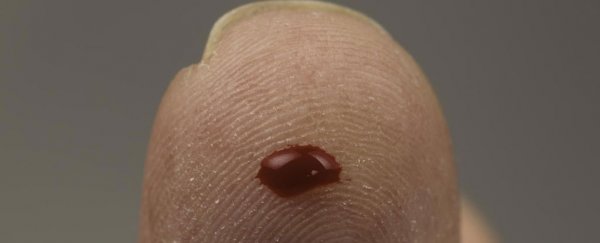Conventional means of finding cancer can involve numerous types of scans and invasive options like surgical biopsies, but a new method of identifying the disease may involve nothing more onerous than a simple prick of a finger.
Researchers at the Umeå University in Sweden have developed a new RNA test of blood platelets that can detect, classify and pinpoint the location of cancer in the body by analysing a blood sample equivalent in size to just a single drop of blood.
"Being able to detect cancer at an early stage is vital," said Jonas Nilsson, cancer researcher at Umeå University and co-author of the paper. "We have studied how a whole new blood-based method of biopsy can be used to detect cancer, which in the future renders an invasive cell tissue sample unnecessary in diagnosing lung cancer, for instance."
While the technique isn't 100 percent perfect yet, it's definitely showing promise. The researchers' blood-based RNA testing method enabled them to identify cancer with 96 percent accuracy – a pretty stunning achievement for such a comparatively non-invasive 'liquid biopsy'.
To test their system, the researchers took blood samples from 283 individuals. Amongst this group, 228 people had some form of cancer, while the remainder (55 people) showed no evidence of cancer.
By analysing and comparing RNA profiles in the blood samples, the researchers were able to identify cancer among the patients with varying levels of success. In 39 patients where cancer had been detected early, they were able to identify and classify the cancer with 100 percent accuracy.
In follow-up tests the system wasn't equally effective but still yielded impressive results. The researchers identified the origin of tumours with an "unsurpassed" 71 percent accuracy in patients with diagnosed cancer in the lung, breast, pancreas, brain, liver, colon and rectum.
The authors of the study aren't suggesting that this kind of 'liquid biopsy' method should replace other cancer detection systems, but it's clear that if the technique can be refined it could hold huge promise for physicians and patients, especially with regard to enabling simpler means of catching the disease at its outset.
"In the study, nearly all forms of cancer were identified," said Nilsson, "which proves that blood-based biopsies have an immense potential to improve early detection of cancer."
